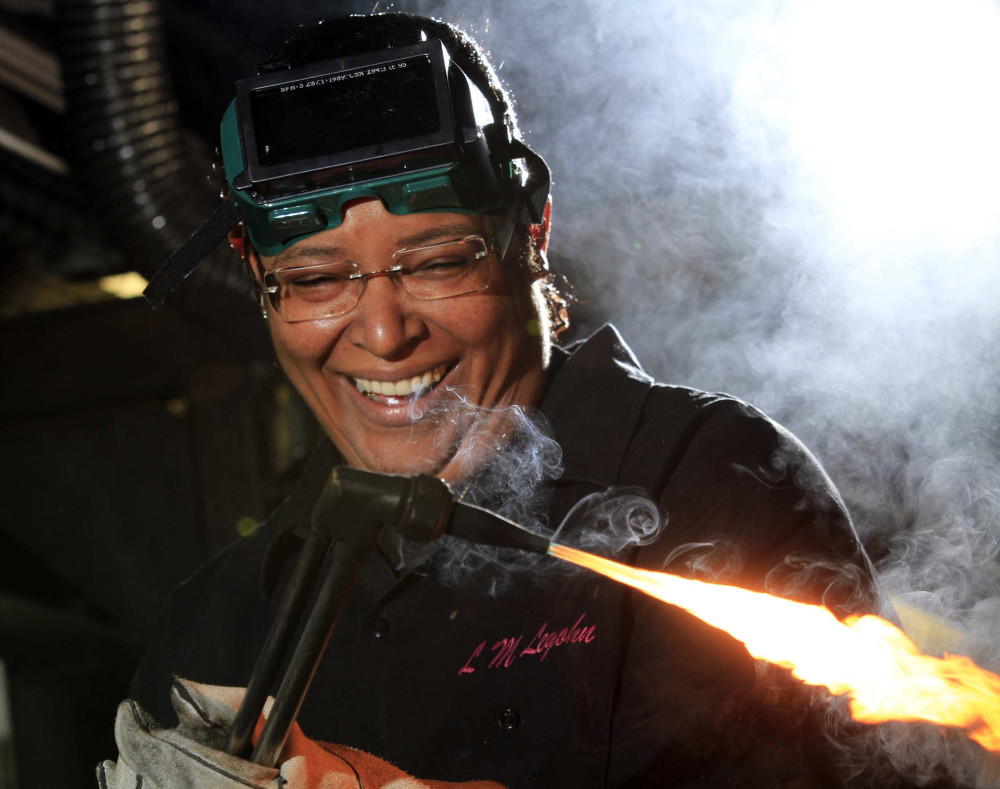By Himani Chandna and Timsy Jaipuria
Hindustan Times, New Delhi
WWR Article Summary (tl;dr) In India, companies such as Samsung, MasterCard, Ford India, Maruti Suzuki and JCB India among others are increasingly empowering women through employment in the manufacturing sector, which was earlier seen as a male bastion. More and more women are opting for roles of technicians where they repair phones, laptops, refrigerators, paint cars or work on heavy construction machines and agricultural equipment.
New Delhi
Many Indian women such as PepsiCo’s Indira Nooyi and ICICI’s Chanda Kochhar have been able to make their presence felt in the global arena.
But there are other women too, who are making a mark in their own little world.
Apart from managing household chores and doing regular jobs, these women are testing their hands at professions such as delivery girls, club bouncers, real-estate brokers, professional bar-tenders, car-painters or industry mechanics.
Mumbai based Chandrika Gadkari, 26, was trying to make ends meet after high school. One day, Gadkari enrolled into a course to learn scooter driving organised jointly by a startup Heydidi and Mahindra Finance. The deal was: Learn driving, deliver products and earn money.
This is how Gadkari broke into the male dominated delivery boy’s market and became country’s first delivery girl. She is now employed by Everyday Gourmet Kitchen’, Mumbai based food processing company.
“I am earning about R 8,000 per month while I was not getting a job worth Rs 1,000 some days back.” Soon, many others like Gandkari would start delivering for e-commerce portals, food retail and fashion portals as Heydidi, a provider of last-mile delivery for ecommerce companies, plans to expand its operations.
Considering the eagerness of women to break into male-dominated sectors, the company aims to employ 10,000 girls across 20 cities in 3 years for delivering products.
Apart from delivery girls, the demand for women bouncers has been growing, thanks to event companies, pub and restaurant owners.
“In 2011, we employed 300 women bouncers. Now, we have been increasingly recruiting women bouncers and they form 25,000 of the total workforce of 93,000 employees. This shows that more women are opting for this profession,” said a spokesperson of Topsgrup, a London-based business security firm that is operating in India.
Female bouncers, on an average, earn between Rs 30,000 and Rs 50,000 a month. To attract more females to the profession, female bouncers are paid better than male bouncers, on an average, an extra of Rs 5000.
Another unconventional job is that of a professional bartender. “The industry has become more open to women working behind the bar and has started to hire female bartenders,” said a spokesperson at Grant, a blended scotch whisky brand from the spirits company, William Grant & Sons.
There is much more to the career of bar-tender than just serving a glass of drink. “With enough experience and knowledge, one can also work at beverage and wine companies in India and abroad — in the field of business development, sales and marketing, or could even be a brand ambassador for a liquor brand,” said the spokesperson. On an average, the salary of female bar tender is around Rs 30,000 at medium-sized club, plus tips of about Rs 5,000.
Companies such as Samsung, MasterCard, Ford India, Maruti Suzuki and JCB India among others are increasingly employing women in the manufacturing sector, which was earlier seen as a male bastion. More and more women are opting for roles of technicians where they repair phones, laptops, refrigerators, paint cars or work on heavy construction machines and agricultural equipment.
Sample this: At JCB India, which manufactures construction and agriculture equipment, there has been a noticeable increase in the number of women employees in the past two years.
From about 1.2% in December 2012, the share of women employees has gone up to 4% in March 2015. The company started its operations in Jaipur last year and achieved a female representation of about 28% at the shop floor and by this year, it plans to increase that percentage to over 30%.
Till last year, JCB employed odd 110 women on floor in India.
At Maruti Suzuki, the representation of women candidates in the company’s manufacturing team has gone up from 274 employees in 2012 to 366 employees in 2014. United Technologies Corp has started an all-women assembly line at its air-conditioner manufacturing facility in Gurgaon.
The real estate sector hadn’t seen many female faces. However, the participation of women as brokers in unorganised real-estate market is surging, experts claim. Moreover, the participation of women, playing the role of brokers, in formal market is also going up. Sangeeta Sharma Dutta, a consultant at real-estate consultancy firm Knight Frank India, calls herself a typical real estate broker, considering the nature of her work.
Despite choosing hectic careers, these women end up balancing their personal and professional life decently. “After office hours, the real battle starts. I struggle to ensure my child is on time for school, I am striving to make him the most delicious and healthy meal so that he never stays empty stomach, I am battling with his syllabus to ensure he gets good grades and I am running hard against time making sure nothing upsets their schedule. While one aspect of our lives from 9 to 6 is quantifiable, remaining 15 hours are not,” pointed out Dutta.ml














































































































































































































































































































































































